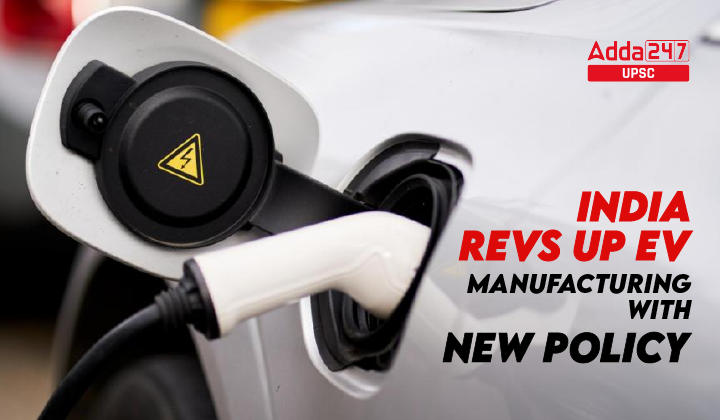Table of Contents
The Indian government has taken a big step towards becoming a global hub for electric vehicles (EVs) with the approval of a new policy. This initiative aims to attract leading EV manufacturers by offering attractive benefits and fostering a robust domestic EV ecosystem.
Key Highlights of the Policy
- Investment Threshold: A minimum investment of ₹4150 Crore (approximately USD 500 Million) is required to participate. There’s no upper limit on investment, encouraging large-scale manufacturing facilities.
- Timelines and Localization: Companies have 3 years to set up manufacturing plants in India and begin EV production. They must achieve a domestic value addition (DVA) of 25% within 3 years and 50% within 5 years. This ensures a gradual increase in local component sourcing.
- Import Duty Concessions: To incentivize participation, companies can import a limited number of EVs at a concessional customs duty of 15%. This applies to fully disassembled (CKD) units with a minimum CIF value of USD 35,000 for 5 years. However, this benefit is contingent on setting up a manufacturing facility within 3 years.
- Import Quota and Safeguards: The total number of EVs allowed for import is capped at 40,000, with a maximum of 8,000 importable per year for companies investing USD 800 Million or more. Unused annual import quotas can be carried forward to the next year. To prevent misuse, the government will impose a bank guarantee equivalent to the foregone customs duty. This guarantee will be encashed if the company fails to meet the minimum investment or DVA targets.
Expected Benefits
- Access to Cutting-edge Technology: Indian consumers will gain access to the latest EV technology through domestic production by leading manufacturers.
- Make in India Boost: The policy aligns with the “Make in India” initiative, promoting local manufacturing and job creation.
- Strengthening the EV Ecosystem: Increased competition among EV players will stimulate the domestic EV ecosystem, leading to advancements and a wider range of options for consumers.
- Economies of Scale: Higher production volumes will lead to economies of scale, potentially bringing down EV costs for Indian buyers.
- Reduced Reliance on Oil Imports: A shift towards EVs will lessen India’s dependence on imported crude oil, improving energy security and reducing the trade deficit.
- Environmental Advantages: Widespread EV adoption will significantly reduce air pollution, particularly in urban areas, contributing to a cleaner and healthier environment.
A Surge in EV Registrations
India’s electric vehicle (EV) market witnessed a remarkable 48% growth in year-on-year sales in 2023, with 15,26,319 electric vehicles hitting the roads, up from 10,25,116 in 2022. This surge underscores a growing consumer shift towards cleaner and more sustainable modes of transportation.
Four-Wheeler EVs Gain Momentum
The electric four-wheeler segment experienced a significant uptick, with registrations climbing to 72,321 in 2023 from 32,260 the previous year. This increase reflects the expanding product portfolio and enhanced consumer confidence in electric cars.
Government’s Ambitious EV Targets
The Indian government has set ambitious goals for EV penetration by 2030: 30% for private cars, 7% for commercial vehicles, and a staggering 80% for two and three-wheelers. These targets reflect India’s commitment to reducing carbon emissions and promoting sustainable mobility.
Two-wheelers lead the Charge
Despite a cutback in FAME II subsidies, the electric two-wheeler segment saw a 36% increase in registrations in 2023, with 8,54,96 units compared to 6,27,353 in 2022. This trend highlights the segment’s resilience and its pivotal role in India’s EV revolution.



 TSPSC Group 1 Question Paper 2024, Downl...
TSPSC Group 1 Question Paper 2024, Downl...
 TSPSC Group 1 Answer key 2024 Out, Downl...
TSPSC Group 1 Answer key 2024 Out, Downl...
 UPSC Prelims 2024 Question Paper, Downlo...
UPSC Prelims 2024 Question Paper, Downlo...




